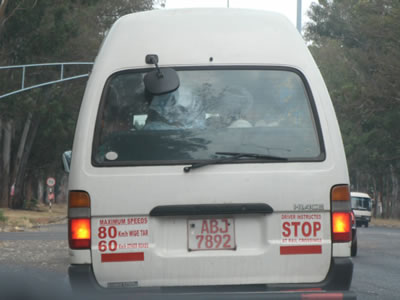Combi Name and Shame
Thursday, October 21st, 2010 by Upenyu Makoni-MuchemwaLast Saturday as a friend and I were driving along Borrowdale Road we witnessed a full commuter speeding at an estimated 120km/hr as compared to the 70km/hr speed limit. To make matters worse the driver was bullying other cars out of his way!
Commuter transport operators have become a law unto themselves. In a report published in The Herald last week, Inspector Chigome from the Zimbabwe Republic Police named commuter transport operators as the main culprits in road traffic accidents that have killed 1 500 people and injured more than 12 000.
The majority of the public have no choice but to take their lives into their hands and board a combi because what other transport options are there?
The police are useless to the public. The recent police blitz on combis ended in commuters having to walk several kilometres to and from work. This is not the first time the operators have taken out their frustrations on the public. In more than one incident, I along with other passengers, have been forced off a combi after complaining about many things, including fares that double or treble after leaving the commuter rank, change not being returned, reckless driving, or overloading.
Police corruption doesn’t improve matters either. I have witnessed for myself a commuter driver bribing the police to get a car that was obviously overloaded and unroadworthy past a roadblock.
This is no way to live. I have had enough. On Saturday I took this picture of the combis licence plate – ABJ 7892. For your own safety, if you see this combi don’t get on it. If you are driving and you see it on the roads, stay very far away from it.










